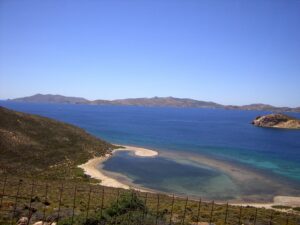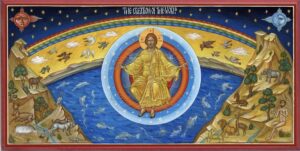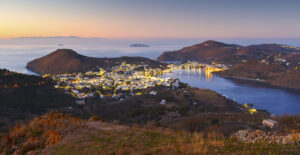Understanding The Revelation (The Apocalypse)
I came home from Patmos with a great tan which must have been a miracle, because my last Post implied that I spent my time there in church – yes? No.

In the old days, I loved to go to a quiet beach and read. I found this little beach ‘way away from town – usually had it to myself. My spiritual project on Patmos was to ponder John’s writings, especially the book of Revelation, to see if I could understand it any better on Patmos where he had been held in exile around the year 90, and where they say he wrote it. I once did a series of teachings on Revelation and wished I had never started. I can see why the Church in the East was very slow to accept the book. Though we Orthodox now consider it canonical, to this day we never read it in our services.
My questions:
1 How could the same John who wrote his Gospel and Epistles in such refined Greek then write Revelation in such inelegant Greek?
2 John is the “apostle of love” – “God so loved the world…”, “love one another… greater love has no man… if you don’t love your brother whom you have seen, how can you love God whom you have not seen…?” So how in the book of Revelation could he write so enthusiasticaly about the wrath of God?
For both these reasons, some have wondered: Was the Apocalypse written by a different John?
3 Is the Revelation a vision or was John only writing in symbols? Or both? And does this strange book apply to modern times?
So on my little beach I read and pondered, first, the Gospel according to Saint John and his Epistles. No problem here. They are said to have been written by him late in life in Ephesus, just across the Aegean in Asia Minor where he settled after leaving Palestine. That’s ok by me. The lovely island of Patmos has the “feel” of Saint John and those writings.
As for The Revelation:
1 If John the Theologian wrote it, why is it in such poor Greek? To begin, earliest tradition is that he wrote it, and over the years I’ve come to trust early traditions more than the speculations of scholars many centuries later. I visited the cave of the Apocalypse, where the Patmians are quite sure John dictated his Revelation to his scribe Prochoros, and I came up with an idea.
The cave is just a little hole in the cliff as you can see here. It would be dank and cold in winter. I can imagine John in old age with arthritis, unable to write. There probably weren’t many scribes on such a small island, and maybe Prochoros didn’t write good Greek, so John dictated and Prochoros wrote as well as he could, which wasn’t very. How about that as a possibility?
2 As for the bombastic content of Revelation, I recalled that Jesus had nicknamed the young apostles James and John “Boanerges /Βοανεργές, sons of thunder” and chastised them because they wanted to bring down fire and destroy a Samaritan village. Over the years John became the “apostle of love” – but perhaps not entirely? In his latter years our Deacon John at Saint Nicholas was also filled with love, but he still had his old fiery, feisty spirit. The two aren’t mutually exclusive. There’s the story from Saint Polycarp that when John entered the bathhouse in Ephesus and found the heretic Cerinthos there, he cried “Let’s get out of here before the walls fall down!”
3 Was Revelation a vision? I had thought so, but Patmos changed my mind. I thinik. Maybe some of it was, especially the vision of Christ in chapter 1, and the similar vision of the Theotokos in chapter 12.

But I tried to imagine the beautiful blue waters of the Aegean turning to blood, and the stars falling out of that gorgeous sparkling night sky, and God pouring out his wrath upon that sweet island. I couldn’t even bring myself to think about it, and I doubt John could either. I can’t imagine him writing such a thing while he was on Patmos. There’s nowhere I’d sooner be exiled than Patmos.
I now suspect that most of the Revelation was written in code to encourage the early Christians, but so the imperial authorities wouldn’t catch on. (It’s an old theory.) One example: the first beast rising out of the sea (to the west, from the Mediterranean) represents Rome, the seven heads the seven Caesars and the seven hills of Rome. However, much of the symbolism refers to events which First Century people knew about, most of which are now long forgotten. What was amazing about The Revelation is this: John foresaw that God and His Church would triumph over imperial persecution – those little bands of Christians would conquer the mighty Roman Empire. Who could have imagined such a thing at the time? But John was right. It happened!
4 So what does the Apocalypse prophesy for our times?
My guess is: Nothing.
All through the centuries false prophets have understood exactly what Revelation predicted for their time, and they were all wrong. They are still around. They can’t even agree among themselves. Ignore them. There’s the story of an early Church Bishop whose people were going crazy trying to understand the Apocalypse. He told them (this is a very loose translation) Cool it! Nobody will understand the book till Jesus comes again.
What does the Apocalypse prophesy for our times?
Actually: Everything,
Because it tells us where all history is headed, that God will finally triumph, that Satan and evil will be destroyed, and God’s Kingdom, the New Jerusalem, will come. And whether we will then be in this world or in the next (for me, it will very probably be the latter), we will all be there when Heaven and earth are finally united.
I wish we Orthodox read this passage in church, from Revelation 21: Then I saw “a new Heaven and a new earth, for the first Heaven and the first earth had passed away… I saw the Holy City, the new Jerusalem, coming down out of Heaven from God, prepared as a bride beautifully dressed for her husband. And I heard a loud voice from the throne saying, ‘Behold! God’s dwelling place is now among the people, and he will dwell with them. They will be his people, and God himself will be with them and be their God. He will wipe every tear from their eyes. There will be no more death or mourning or crying or pain, for the old order has passed away.’”

Yes, “Come, Lord Jesus”! Revelation 20:22 We’ve waited too long, too long.
But then again, if He had come in Apostolic times, or anytime during the succeeding centuries, then I and all the people I love would never have existed and would never be offered eternal life. So on the other hand… thank you, Lord Jesus, thank you for waiting.
Saint Nektarios does it again – this time on Patmos!
This was a new one. Previously all my experiences with him had been in connection with his shrine on Aegina. On each trip there, strange things happened.
I told you last week how, on my first visit to Saint Nektarios, I wasn’t prepared, was late and in a panic asked Agios Nektarios to get me there. And how I got a free ride, a completely unexpected tour, and… well, if you didn’t read last week’s Post, go back and check it out.
 Sometimes what happened was subtle, just enough to make me wonder… but always connected with visiting Saint Nektarios
Sometimes what happened was subtle, just enough to make me wonder… but always connected with visiting Saint Nektarios
Like the time I visited the shrine and, returning to Athens, a ferocious storm over the sea chased after us, and the flood was so bad that if I’d been ten minutes later I’d have been stranded at the dock. The water actually poured into the front lobby of my hotel within minutes after I’d got there. Hmmm…
And like the time I was going to Aegina and my hotel was at an obcure location. I had to make three metro connections to get to the port and thought I’d catch the 10 o’clock ferry. At each connection a train was waiting, and I got to the dock thinking I’d just missed the 8 o’clock.
But there it was – late. The ticket agent said “Hurry, mister, or you’ll miss the boat.” I ran and caught the 8 o’clock with about 15 seconds to spare. Hmmm… Again, just enough to make me wonder.
But sometimes what happened was startling. After I had said my prayers before the relics of Saint Nektarios, I sat down on a bench outside the chapels just to watch the pilgrims come and go. A voice beside me asked “Are you an American?” She already knew the answer. It was a woman I hadn’t seen in at least twenty years. We had worked together in the Episcopal Diocese of Milwaukee, her husband an Episcopal priest. They had moved away, and we lost touch. I had become Orthodox, an Orthodox priest. Meanwhile they, unbeknownst to me, had become Orthodox and her husband was an Orthodox priest! Now, I ask you: What were the chances that we three would wind up sitting beside each other on the same bench on that little island visiting Saint Nektarios, 5000 miles from home, on that exact day, at exactly the same time? You calculate the odds. This time I felt sure: Saint Nektarios did it again.
I won’t tell you today about the time – this took place after the story I’m about to tell you – when I got stranded on Crete – no gas, no petrol station for twenty miles around – and he put a third of a tank of gas in my car’s gas tank. Well, somebody did it. It was empty before. He was the one I asked for help. (I guess I just told you ths story!)
I think you’ve now got the picture.
This time it was on Patmos. I had been alone out at the little beach, several miles away from anyone. No one had been around all day except for a Greek fisherman who stopped by at noon. Now it was late afternoon.

For safety so that nothing could be lost, in my backpack I had carried three plastic bags, each packed very carefully and sealed – one with food, one with water, one with the keys. I checked carefully; everything was there before I left the beach, climbed up the path to the car, and went through my bag. No keys. I searched all the bag again: No keys! I looked through everything a third time: NO KEYS! I began to panic. What was I to do? and without forethought, not even saying “please”, I blurted out, “Nektarios, my keys!” I then reached into the back pack and instantly pulled out the keys. They were right on top. I am sure, absolutely positive, they had not been there a moment before. How else to explain it? Saint Nektarios did it again!
My discoveries this time were: 1 I learned that Nektarios’ work wasn’t limited to Aegina. 2 I had now learned automatically where to turn for help.
Looking back now from 2024, I have no doubt in my mind: Because of my shallow spiritual nature Saint Nektarios had to catch my attention with little “tricks” such as these. He led me on again and again. Why? So that, six years later in a truly dire situation back home, I would know without hesitation exactly what to do: Saint Nektarios, help! Thank God. Thank you, dear Saint Nektarios.
Leaving Patmos
I left Patmos on a 2 a.m. ferry. Why do ferryboats arrive and depart there in the middle of the night? On the dock was a coterie of Greek widows joking and laughing uproariously about something. I decided I must learn more Greek so that on future trips I could find out what was so funny. Or maybe it was better not to know. Maybe it was about me!

The phenomenon of the ship’s lights rising out of the undifferentiated blackness of the night sea and the night sky, out of the nothingness, was surreal. The lights of the Monastery of Saint John atop Patmos were the last to sink into the blackness. Next morning we were in Athens.
As always I visited Aegina and Saint Nektarios. I told him that I’d had enough for one visit. No more little “signs”, please, just a happy visit, and that’s what I got. I told you before that I first visited Nektarios because my parishioners Tony and Chris Wood had come back from there trying to tell me what it was like there. I could tell their words couldn’t express it, so I went to find out for myself – and I did find out. Whatever time of year, whatever time of day, whatever the weather, there was a sense of light and peace and joy and happiness at the place. I always cried sweet tears. It’s “heavenly”. When Tony was dying I told him, “Hang onto what you felt at Saint Nektarios. That’s where you’re going.” I will try to do that when my time comes, and pray that by the grace of God that is where I’m headed.
As pilgrims came and went I offered up the names of the 562 people my parishioners asked me to pray for. (The number goes up every year, but who’s counting?) The little widow took the list again, so the nuns could pray for them. Then I had time to pray the Jesus Prayer for about half an hour. It felt like only a few minutes. The feeling of Saint Nektarios would hang over me for days. Even after I got home, I was still a little weepy in a very happy way.
True Religion
I wrote this after we flew out of Athens, headed for Chicago.
As I got onto the bus for the Athens airport this morning, I saw the bus driver was wearing a prayer rope. Along the way I looked up and saw someone going into a church to pray. Later I looked up again and saw a woman coming out of another church. At the airport right over from McDonald’s where they served… no kidding, Chicken Mythos! there was the airport’s Orthodox chapel. The icons were not very good, but they were there. Orthodoxy in Greece, integrated with life. Why does Christianity in the West (even in America where we still have so much religion) seem so disconnected, so fragmented, so cut off from life?
One night while I was in Greece, on the BBC I heard a debate over whether God exists, between Christopher Hitchens, a brilliant atheist conservative * with whom I disagreed about almost everything, and an utterly unfocused Anglican Dean of Somewhere or Other who, speaking in his gentile upper-class English accent, made no sense whatsoever. The atheist easily won. But it wouldn’t have made any difference if the Christian had won.
- He has since died. He had been badly hurt in life. I think he was a good man, just very confused. I hope God has received him. Pray for him.
The answer is not in intellectual argument. The answer is in the living of it. There is more true religion in sincerely lighting a candle and saying a prayer, or in venerating an icon, or in hugging someone, or in giving money to the poor, or in working for justice, or in my experiences with Saint Nektarios, than there is in all the debates in the world. True theology is essential, but true religion is found not in words but in life. Orthodoxy is not a doctrine; it is a way of living.
So I returned to what seems to me to be our ever more unfocused, disoriented, disintegrated American society, renewed again, rejuvenated in Orthodox life. God knows Greece and Orthodoxy in Greece are far from perfect. Nevertheless Greece and Saint Nektarios came through again. And coming back to American Orthodoxy and to my people at Saint Nicholas, Cedarbug was a joy, because what I experienced of Orthodoxy in Greece is also to some extent here, for Orthodoxy is here, not just being believed but being lived. Orthodoxy and her people are my rock. They are true religion. If I didn’t have Orthodoxy I honestly don’t know what I’d do.
Next Week: Miscellaneous, Part One – a bunch of short items, none of them long enough to comprise an entire Post: 1) School shootings, 2) An excellent short Teaching by His Eminence Metropolitan Saba, 3) Good manners and politics, 4) What qualities should we want in our political leaders? 5) Videos: an atheist reviews two Orthodox churches. 6) “The Clash of the Patriarchs”, 7) My comments about the present Orthodox mess, 8) The unholy war against Ukraine.
Week after Next: Miscellaneous, Part Two